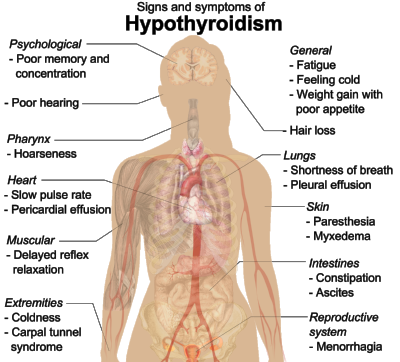Hypothyroidism
An estimated 27 million Americans have thyroid disease; more than half are undiagnosed. Frequently misunderstood, and too often overlooked, thyroid disease affects almost every aspect of the body. Understanding more about the thyroid and the symptoms that occur when it malfunctions can help patients to protect or regain good health.
Hypothyroidism is the condition in which the thyroid is underactive. In other words, it is producing an insufficient amount of thyroid hormones. Hypothyroidism is the most common thyroid disorder. A condition called secondary hypothyroidism sometimes occurs when a failing pituitary gland stops stimulating the thyroid to produce thyroid hormones.
The thyroid has the only cells in the body capable of absorbing iodine. It takes in iodine – obtained through food, iodized salt, and/or supplements – and combines it with the amino acid tyrosine. The thyroid then converts the iodine/tyrosine into the hormones T3 (triiodothyronine) and T4 (thyroxine). (Three and four refer to the number of iodine molecules in each thyroid hormone molecule.) When everything is working properly, eighty percent will be T4 and twenty percent T3. T3 is considered the biologically more active hormone — the one that actually functions at the cellular level — and it is several times stronger than T4. When the thyroid releases T3 and T4 hormones, they travel through the bloodstream to help cells convert oxygen and calories into energy.
As aforementioned, the thyroid produces some T3, but the rest of the T3 which the body needs is formed from the mostly inactive T4 by a process sometimes referred to as T4 to T3 conversion.
This conversion of T4 to T3 can occur in some organs other than the thyroid, including a part of the brain called the hypothalamus. This is because the thyroid is part of a huge feedback process. The hypothalamus in the brain releases thyrotropin-releasing hormone (TRH), which tells the pituitary gland to release thyrotropin, or thyroid-stimulating hormone (TSH). TSH circulating in the bloodstream tells the thyroid to make thyroid hormones.
There can be many causes for thyroid problems. These include overconsumption of soy protein (isoflavin) and powders, exposure to radiation, certain prescription drugs, surgical thyroid treatments, over- or underconsumption of iodine, and overconsumption of uncooked goitrogenic vegetables, such as cauliflower, broccoli, turnips, kohlrabi, and radishes. Women are at the greatest risk, developing thyroid problems seven times more often than men. A woman faces as high as a one in five chance of developing thyroid problems during her lifetime. Increasing age and family history of thyroid dysfunction increase this risk.
Other risk factors include pituitary or endocrine disease, autoimmune disorders, chronic fatigue syndrome, menopause, smoking, being in the postpartum period, fibromyalgia, and being a woman over the age of sixty.
Prescription drugs can be used to stimulate the thyroid, but research has shown that bio-identical hormonal treatments work best for hypothyroidism. Dr. Roberts educates patients about various treatment options, tests for thyroid abnormalities (potentially including other hormonal deficiencies which may affect thyroid function), and, when indicated, may prescribe pharmaceutical and/or compounded medication. She may also offer natural supplements and vitamins which may be helpful in promoting good thyroid and hypothalamus gland health, including certain enzymes.
The goal of treatment is to restore the thyroid gland to normal function, producing normal levels of thyroid hormones. Annual or semiannual checkups are usually required to ensure proper medication dosage. A patient usually takes thyroid hormones for the rest of his or her life. Dr. Roberts is one of the best-trained physicians in the area on bio-identical hormone replacement, and enjoys working with patients to optimize thyroid health and wellness.

